- Home
- Barry Unsworth
The Partnership Page 4
The Partnership Read online
Page 4
‘I didn’t mean it quite like that,’ he said in an attempt at appeasement, but Graham had retreated into a corner of the room and would not answer or look at him. After two further attempts he gave it up and took his leave.
Even before reaching the car his sense of having spoken up for humanity had lost its power to please. What was the girl in the post office to him? Besides, he had not disagreed with Graham for her sake, but because he had felt himself slighted. With a little more restraint he could have had it both ways, kept his sympathy for the human race, and Graham’s confidence. He felt his latter loss as extremely serious. It had the element of unresolved discord which he hated; it considerably increased the chances of Graham cheating him; and he now ran the risk of being put into Graham’s picture. It was particularly disagreeable to think of his own face, whose every lineament he knew so intimately, undergoing the distortions suggested by Graham’s malice.
It was not in this way, however, that he was putting the matter to Gwendoline a few minutes later, esconced in one of her armchairs while she sat across the room facing him in another.
‘I couldn’t let him get away with it, you see,’ he was saying, with an assumption of manly forthrightness. From the first he had simplified himself for Gwendoline, presenting the sort of obtuseness which he thought most likely to succeed with her, by giving her scope for the female wisdom she seemed rather keen on. It was a flattery more telling in the long run, he felt, than mere compliments about her looks. To keep it going had meant doing some violence both to his innate secretiveness and to his habit of seeing all sides of a question; and he was not absolutely sure yet that it was the right course. But at least he had discovered that Gwendoline liked the issues as broad as possible so she could get to work breaking them down. This was an activity she enjoyed very much, even when it concerned people such as Graham whom she had never met.
‘I felt I had to tell him, you know,’ he said.
Gwendoline looked seriously back at him for some moments without replying, as though she already saw more in this matter than he did. It was an attitude which might normally have irked him but he was still too taken up with Gwendoline’s appearance to bother about it much. He thought she was looking particularly attractive this morning. Her hair, which was brown with glints of unapplied auburn, was pinned up on her head in the rather careless way he thought of vaguely as being French. It was a style very becoming to her because it showed to advantage the strong, graceful curve of her neck. Everywhere you looked at Gwendoline there was this satisfying fullness. She was a meaty girl. She would have been a gift to the sort of painter that likes painting women getting in and out of the bath. This morning she was wearing a fawn dress of some linen material which shone softly at the points where her body pressed against it, at the shoulders and the high full breasts and along her monumental thighs when she shifted helplessly in her chair. It was the suggestion of helplessness, a sort of unease, as though her body needed soothing, that Foley found most stirring; there was something in it still of the anguish of girlhood where the poise is precarious and seems to depend on the charity of the beholder. He had never found this hapless appeal in thin girls, who find it easier to be all of a piece and have to be content with mere fragility.
Her self-distrust, however, was entirely of the body. It never seemed to affect her belief in the accuracy of her judgements; a fact which she demonstrated now by saying very positively, ‘He won’t forgive you.’
Foley showed his teeth in a smile and held it for some time. ‘That doesn’t worry me,’ he said. Privately he found her remark presumptuous, especially as it expressed his own misgivings. It was a great pity, he sometimes felt, that girls like Gwendoline, otherwise admirable in every way, so often set up as specialists in people’s feelings: it prevented them from giving support to a man when he needed it. ‘I should worry about that,’ he said. ‘Ha, ha.’
‘No, but listen,’ said Gwendoline. ‘I mean you have told me about this, haven’t you, and what I feel about it is this, that you ought not to have waited so long before saying that to Graham. You should have made your position clear from the start. You let him feel that you agreed with him all that time, don’t you see that, Ronald?’
‘Yes,’ said Foley. ‘Yes, I do.’ In his relations with women he nearly always got bogged down in this sort of insincerity sooner or later, because of his fatal habit of trying to be what people seemed to expect. He had felt sure that what Gwendoline would most like in a man was a sort of virile predictability, plenty of fodder so to speak for her intuition. Instead of rupturing himself in the effort to achieve this he should, of course, simply have behaved naturally. He tried briefly to picture himself behaving naturally, but could not manage it.
‘Graham is a very good painter, you know,’ he said, with some idea of restoring his own credit by praising Graham up a little. ‘He did one painting I like very much, of his dog Flossie. He adores her, it’s the one love of his life. He wants to have something to remember her by when she dies. The whole painting is just Flossie’s face looking at you full on. I never realised before I saw it what tragic faces dogs have. He’ll never sell it, of course.’
‘Artists,’ said Gwendoline, ‘are different from other people, they feel things more.’
Foley experienced a temptation to point out to Gwendoline that Graham would detest her too if he knew of her existence. He saw now that he had made a bad mistake in rushing to her in this dishevelled manner, claiming a false triumph. He should have known that there are some things a woman should never be directly invited to comment on, especially such a judging girl as Gwendoline. It would be time for him to go soon and he was no further forward. He felt it as vitally important that he should kiss Gwendoline this morning. It was on the meticulous observance of such details that the ultimate success of the whole plan depended.
He eyed her stealthily. She was looking dreamily at the carpet beside her feet. Her mouth was full, slightly pouting, a delectable mouth, but he felt no desire to kiss it: all desire had been lost in the terrible necessity for action. She was only a few yards away, but it might as well have been miles. How to find some way of navigating the pitiless expanse of carpet, getting within range? The whole operation seemed incredibly difficult. All very well, the sudden impulse, when bodies were close: closeness after all would condition her to some extent. The thought would surely be in her mind too. But he had not realised that morning, mapping the whole thing out, how very rarely, in the normal course of things, bodies come to rest in this proximity for long enough to bring off such a coup.
He got up from his chair and walked over to the bookcase in the far corner of the room. ‘Are these all your books,’ he said, ‘or do they go with the house?’
She made no move to join him. ‘Some of them are mine,’ she said. ‘The ones that were here before are all pretty ghastly. I had to bring some of my own.’
Foley read out one of the titles at random: ‘The Snow Goose by Paul Gallico. That must be one of the landlord’s, isn’t it?’
‘It’s one of mine, as a matter of fact,’ said Gwendoline coldly.
He felt himself blushing. Bending further down, he began scanning the books on the bottom shelf. ‘There’s one here I can’t see the title of properly,’ he said.
‘Which one is that?’ said Gwendoline. ‘Do you mean the red one with the torn cover? That will be one of the landlord’s.’
After hovering over the books a few moments longer, Foley gave up and went towards one of the prints that adorned the walls. ‘Do you like Modigliani? he said. ‘Why do his people always have such long necks? Is it signed? Perhaps they don’t put the signature on reproductions.’ Instead of coming to show him she got up and went over to the bookcase. She took out the tattered book and looked inside. ‘The Compleat Angler,’ she said. ‘Did you ever?’
Foley abandoned his scrutiny of the print and moved quickly towards the bookcase. Before he could reach her Gwendoline had replaced the book and gone round the ba
ck of the chair into the middle of the room. ‘The signature is in the right-hand corner,’ she said. ‘I can see it from here.’ She sat down in her chair again and gloomily Foley resumed his. The thing to do was to rise unhurriedly and saunter over, sit on the arm of her chair. As effortless as a bee settling on a flower. He was beginning, in fact, with a rather terrible sense of weight, to raise his buttocks from the chair again, when Gwendoline suddenly spoke:
‘It seems to me from everything you say,’ she said judiciously, ‘that Graham has integrity at least.’ Integrity was a word she used a fair amount. She glanced as she said it round the square sitting-room, at the Modigliani prints on the white walls, the green glass lobster float in its cradle of brown cord which she had found on the beach one day; as though these things quietly demonstrated her own. ‘He is all of a piece,’ she added, thinking perhaps that the term needed elucidating for Foley.
‘Yes, he is, he certainly is,’ Foley replied, with a heavy imprecation on Graham’s head. The moment had passed; he did not feel capable of nerving himself for it again. Quite suddenly he was given over to a deep depression. It was not anything complicated in the business which daunted him; he liked complications, they justified his habit of scheming. In this case the sheer simplicity of the thing was defeating him, the absence of cover. ‘It’s time I was going, I’m afraid,’ he said, beginning to rise from his chair.
‘There’s something you must see before you go.’ Gwendoline said.
‘What is it?’
‘It’s something you don’t see in a girl’s room every day.’ She spoke in the tone of one who wishes to provoke curiosity. Foley with some difficulty kept up the expression of interest he had immediately assumed. Was the girl actually going to ask him to guess?
Gwendoline held his gaze for a short while, smiling. The enigmatic was the effect she generally aimed at and it worked well enough when her face was in repose or only just smiling, helped by the slow-moving, heavy-lidded eyes and the full mouth. But when she allowed the smile to broaden, as she did now with pleasure at her secret, the whole effect collapsed into a sort of primitive rejoicing, a prolonged and soundless chortle, which was entirely captivating.
‘It’s a toad,’ she said. ‘I’ve got a toad in the house. In this room.’
‘Good Lord!’ exclaimed Foley, startled. ‘What are you doing with a toad?’ He glanced quickly down. ‘Did you say it was in this room?’
‘Yes, it’s in a kind of tank behind the sofa. Come and look at it. You don’t mind toads, do you?’
‘No,’ Foley said. ‘I don’t mind them. But why have you got one? Do you like them very much?’
‘I have to draw it for a book. I haven’t started yet though. I’m still studying it.’ She went across to the sofa and kneeling on it looked down over the back. ‘Come and look,’ she said.
The tank was a metal water cistern, speckled with rust. The sides were a good two feet high and slippery, so the toad probably could not have escaped; in any case it had clearly, for the moment, stopped trying. It sat in one corner looking at them unwaveringly, in a posture which, though inert at present, promised a rather gruesome sprightliness. Not by any apparent increase of tension did it acknowledge their regard.
Gwendoline said: ‘Don’t you think he’s rather sweet? I have to keep him indoors because toads must be kept warm. Warm and moist.’
‘Warm and moist,’ Foley repeated. ‘I didn’t know you were illustrating a book.’
‘It’s a book for children, all about toads, or rather one toad; by a woman called Dove-Gibson who is a friend of an uncle of mine. That’s how I got the job, through my uncle. He thinks I can draw anything because I was at art school for a year. Toads are difficult, though.’
As they leaned together over the back of the sofa their shoulders touched. Gwendoline did not move away. Immediately, the normal symmetry of Foley’s sensory equipment was wrecked, all sensation flowed swiftly to that little patch of eager skin where beneath his own three layers of clothing and Gwendoline’s probable two this warm pressure – surely slightly firmer now? – persisted.
‘I’m getting quite fond of him, believe it or not,’ Gwendoline said. ‘He’s absolutely no trouble at all, no dirty habits.’
The toad continued to regard them with beautiful dark eyes under avuncular bulges. Bronze-green pimples like minute bubbles of lava covered its back and sides; and a softer, livid pouch below its throat sagged and distended regularly, marking the pulse of its life. Keeping his eye on the toad, Foley shifted his position cautiously until the whole of his upper arm was pressed closely against Gwendoline’s in a manner which could no longer be regarded as accidental: and still she did not move. Now, he told himself.
Gwendoline said: ‘He would make a good pet if he was house trained. Toads are intelligent.’ Her voice was perfectly composed. Foley uttered a sound that could have expressed incredulity or assent or derision. ‘It’s true, they are intelligent,’ she insisted, turning her head with what seemed sudden vehemence towards him.
Foley, with a sense of imminent suffocation, bent his head and kissed her on the corner of the mouth, then worked round gradually until he was kissing her full on. Her lips parted during the latter phase and she leaned suddenly and heavily against him so that he would have fallen if it had not been for the back of the sofa. The kiss was a long one. When it was over they did not look at each other. They remained for some moments with the sides of their faces pressed together. Neither of them said anything. Foley tried to make his breathing less noisy by distributing the breath equally between mouth and nostrils: it didn’t seem to make much difference. Then Gwendoline declined her head and he began to move his mouth softly backwards and forwards across her nape. He kept his eyes open throughout, which helped to give him a feeling of detachment. The drooping angle of her head enabled him to see a little way down the back of her dress, a silky tracery of blonde spine hairs, the blunt sprouts of her shoulder-blades. Raising his eyes he had a last impression of the toad pulsating away in its corner, its webbed feet still as stone, before he yielded to the irresistible logic of the situation which demanded, despite his limited aim being well accomplished, more decisive action on his part – action which he now set under way by a gentle but firm pressure on Gwendoline’s left shoulder and a gradual reclining of his own body, two manœuvres designed by their cunning coincidence to bring her down, drugged and docile, beside him on the sofa. But this trend to the horizontal was evidently not a logical consequence for Gwendoline, who stiffened and drew away.
‘No, don’t,’ she said, in an incisive, not at all pleading tone. ‘We mustn’t.’
Foley brought himself up abruptly to a sitting position. He was for a few moments filled with a sharp accusatory resentment. But as he cooled down he began to find her reluctance reassuring. It had all been provided for in the plan. It had in fact the encouraging quality of a partially fulfilled prophecy. With a flash of complacent insight Foley now understood her seeming composure of a short while before. It had ruffled him vaguely at the time that she had not been more tremulous, but now he saw why: she simply did not know what it was all about.
‘Why mustn’t we?’ he asked. She had begun tidying her hair, a sure sign that all, for the time being, was over.
‘Because it would be Wrong,’ she said. With a hairpin held in her teeth it came over indistinctly but with unimpaired moral force.
He did not press her further, thinking he knew the answers she would make. It was a fairly standard line, after all. Besides, he was unwilling to offend by the gross suggestion that there could have been any real prospects for him, on this the occasion of their very first kiss. He was somewhat surprised indeed that the matter had been raised at such an early stage. But perhaps she had been told by her parents or guardians that kissing led inevitably to that.
He conducted the farewells somewhat clumsily, falling, in his anxiety to avoid all marks of vulgar jauntiness, into an excessively social manner. ‘We must meet again soon,’ h
e said, as though merely anxious not to lose touch. An unfortunate and ill-judged attitude, as he realised at once. She came out of these exchanges at the door considerably better than he did, with her narrow-eyed, enigmatic expression fully reassembled. He collected himself at the last moment, and remembering that girls like to know where they are with dates asked if he could call again on Friday, for which visit, of course, he had already established an alibi with Moss. She said with unflawed composure that that would be lovely. Friday morning then.
3
Despite the uncompromising beginning to the visit and this slight raggedness at the end, Foley was distinctly pleased with the way things had gone. So much so that as he walked back to the car he was able to dwell on his own part in it without any of the usual misgivings. He was compelled to recognise a certain debt to the toad, but how adroitly he had seized the occasion. He wondered with momentary uneasiness whether Gwendoline’s view of the matter quite coincided with his own, but decided that it couldn’t possibly not. Of course, she would not have a wide range of comparison.
The harbour was for the moment deserted. Foley stopped to watch a crowd of herring gulls disputing some fish offal in the shallows near the quay. They appeared to dispute, that is, but in fact they were taking turns at it and shrieking just for form’s sake. There was only room for one at a time to alight, so each had to shred off quickly what gobbets it could, before being dislodged, and there was a constant flux of cursing gulls in the air above the offal. Foley watched them for some time with a sort of growing protest. The unseemliness of their haste affected him disagreeably; he was struck by the contrast between their grace in the air and their nastiness on alighting. Up there they were beautiful and assured, fractionally avoiding collisions, wheeling with marvellous precision as though on palpable slipways of air. But when they settled, balancing clumsily on the putrid prize, in those few stationary seconds each in turn was revealed for an unclean scavenger, betrayed by the vulturous shuffle of the wings, the carrion glaze on the beak, the rheumy, stupid eyes.

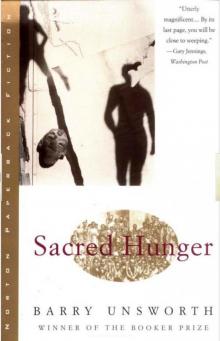 Sacred Hunger
Sacred Hunger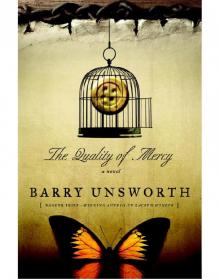 The Quality of Mercy: A Novel
The Quality of Mercy: A Novel The Songs of the Kings: A Novel
The Songs of the Kings: A Novel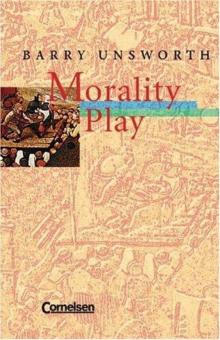 Morality Play. Mit Materialien. (Lernmaterialien)
Morality Play. Mit Materialien. (Lernmaterialien) Stone Virgin
Stone Virgin Land of Marvels
Land of Marvels Mooncranker's Gift
Mooncranker's Gift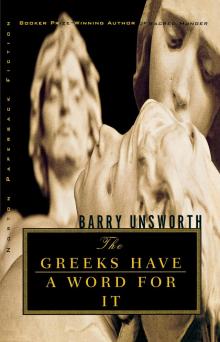 The Greeks Have a Word for It
The Greeks Have a Word for It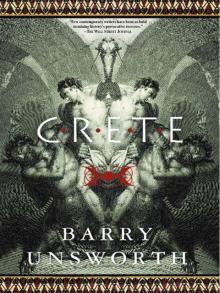 Crete
Crete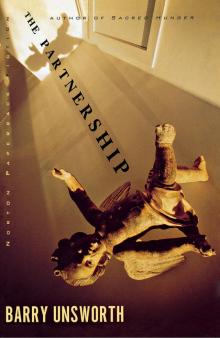 The Partnership
The Partnership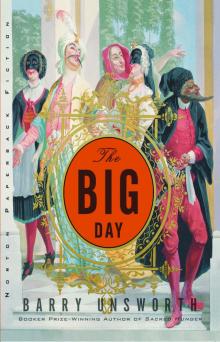 The Big Day
The Big Day The Hide
The Hide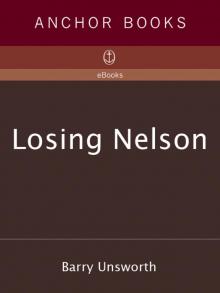 Losing Nelson
Losing Nelson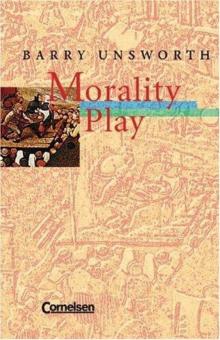 Morality Play
Morality Play Land of Marvels: A Novel
Land of Marvels: A Novel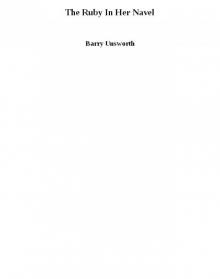 The Ruby In Her Navel
The Ruby In Her Navel